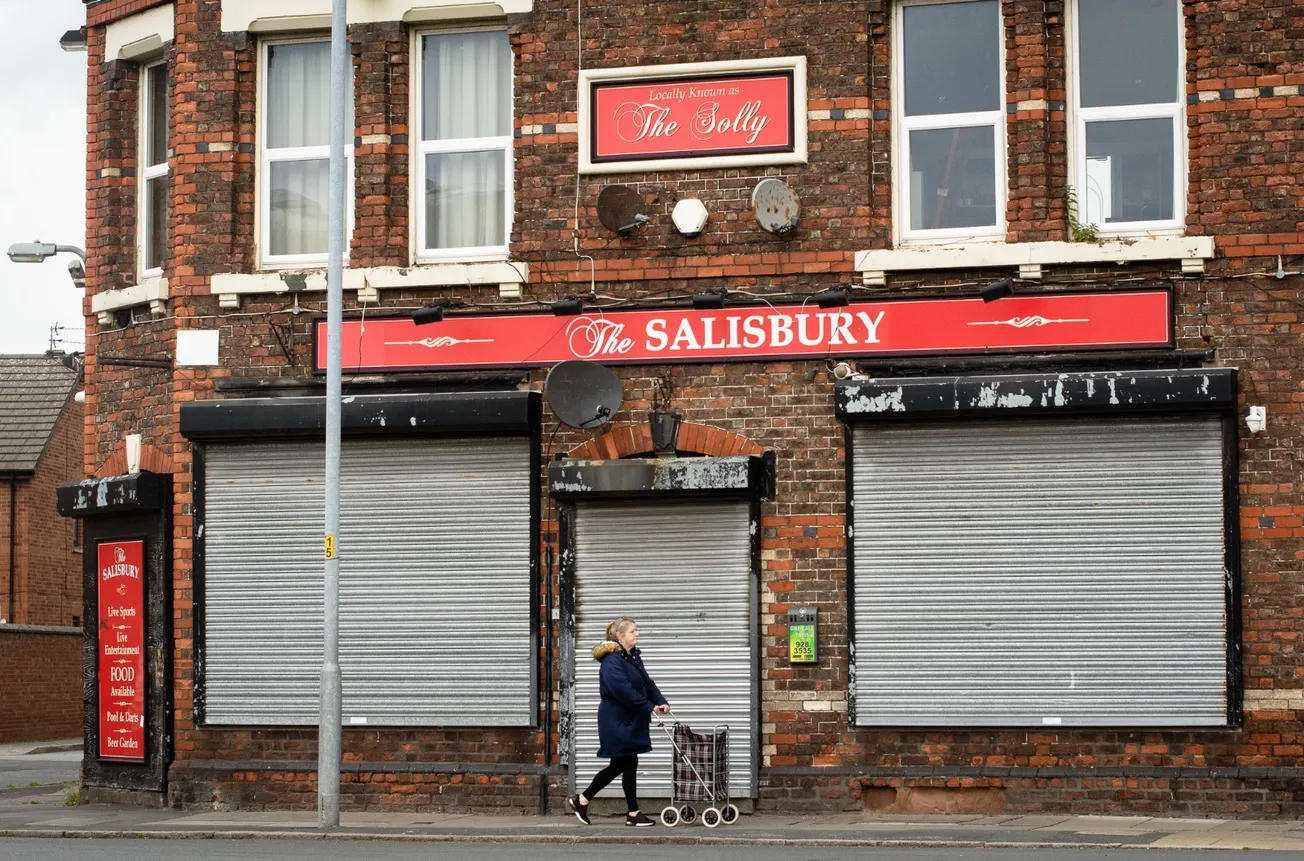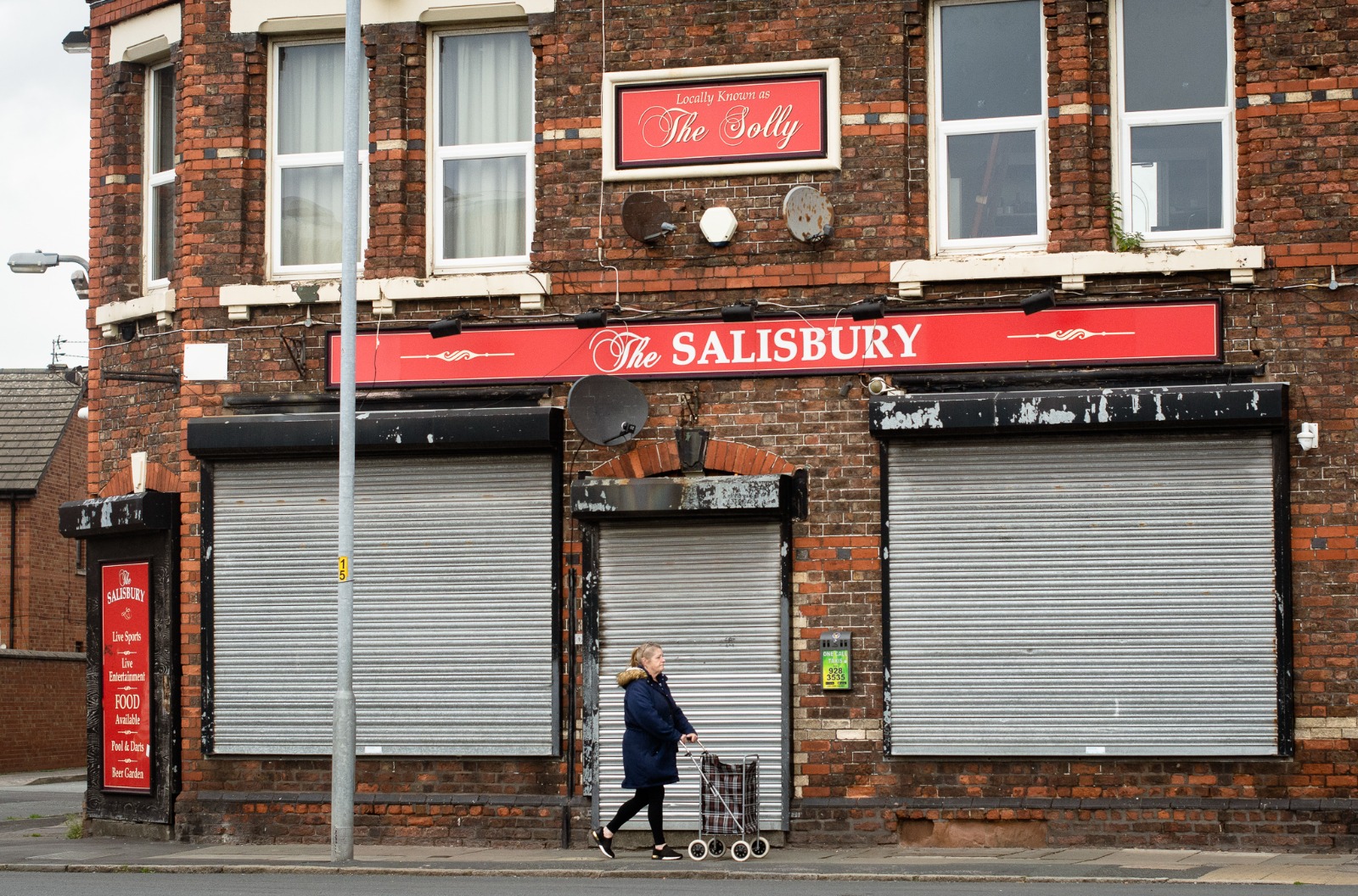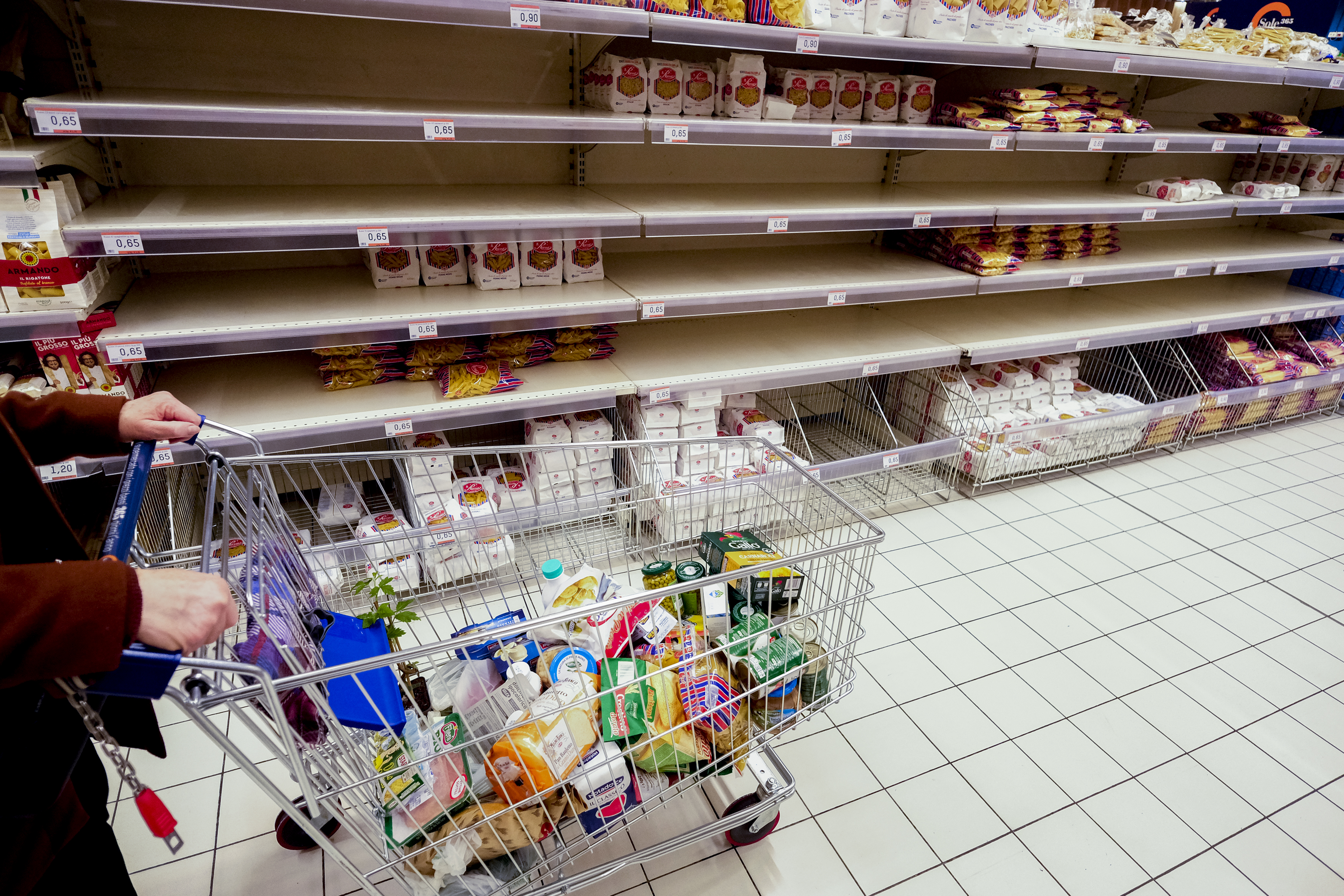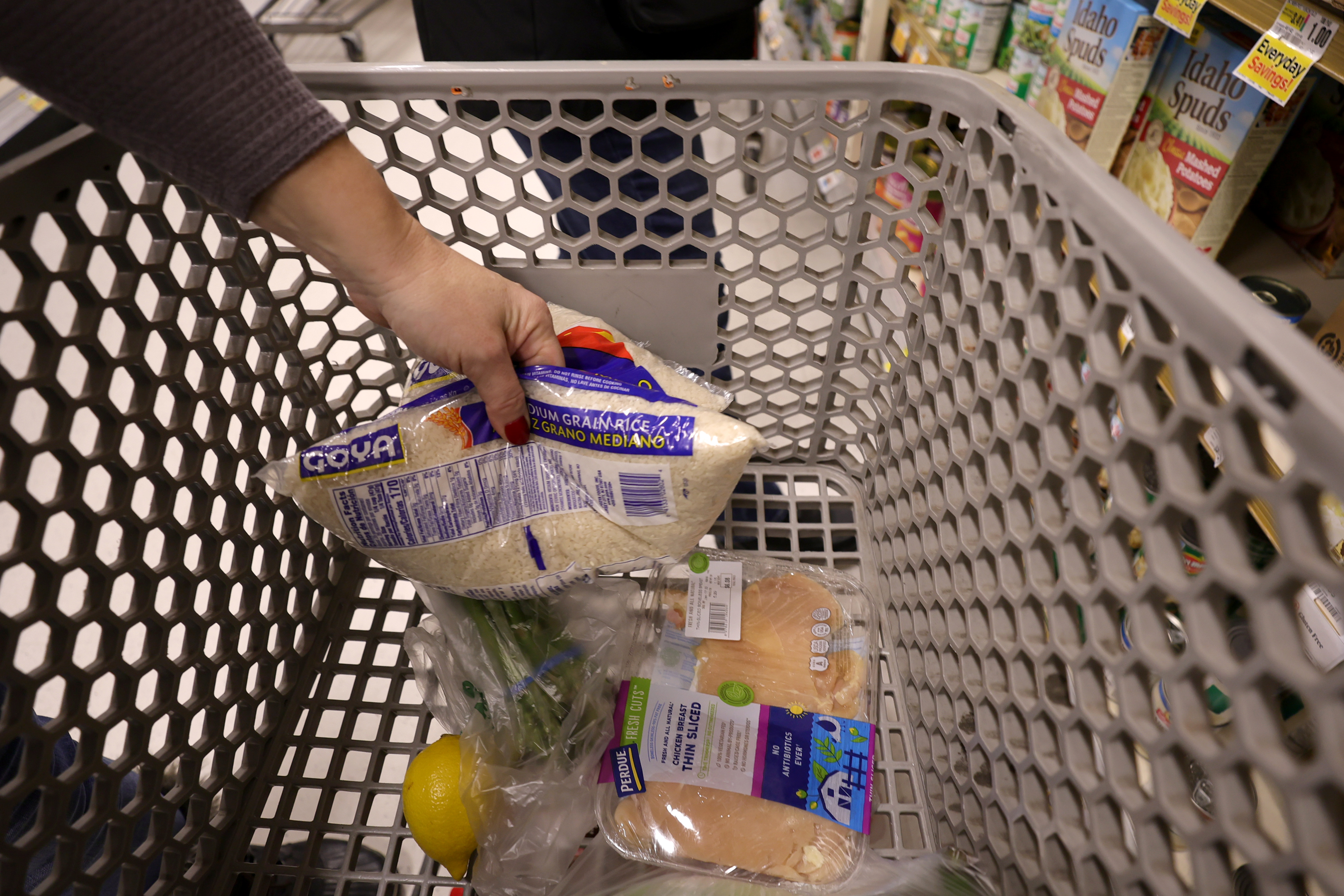‘This is why people kill themselves, because they can’t provide for their children’

The cost of living crisis hits a mother in Bootle
On Monday afternoon, Caroline steps into Lidl in Bootle with her son Ollie, nearly two. Her hair is auburn, falling down her back. She has just been to the bank to withdraw money from her overdraft for her weekly shop. The air is still springlike and she’s wearing all white, a short-sleeved t-shirt and jogging bottoms. “I like going at 5pm because it’s quieter,” she tells me. “Never take kids anywhere when you’re in a rush.”
We wander through the aisles. The priority is fresh fruit and vegetables, meat, eggs, nice cereals and baby wipes. “I’m a from-scratch cooker,” she says. “I find it easy to pick up vegetables and cook. I find that Portuguese and Brazilian food, their food’s well more cost-effective than the British lasagne. It costs you like £8 to make a lasagne. It costs you like £4 to make a Brazilian stew.”
She picks up a small punnet of blueberries for Ollie to snack on while we walk. Then she picks a fresh bunch of bananas, some button mushrooms and a bag of potatoes. “A lot of my shops are similar,” she tells me. “So I’m on the same budget, so you don’t cross out of it or over it or make mistakes.”
What does she mean by mistakes? “Buying something unhealthy, or too expensive for what it is,” she says.
Caroline is a single mother of three. She rents a house near Derby Park for £650 a month. Her monthly income comes to £1,200 — from Universal Credit, child support and alimony from her first boyfriend.
Ollie is nearly two, but he has never spoken a word, not even ‘mum’. He’s non-verbal autistic and can start to get help with his development once he turns five. Her older son has cystic fibrosis and spends time in and out of hospital, so a portion of her monthly budget goes towards taxis to take them to Alder Hey and back. The family’s routine, easily disrupted by a flare up or school holidays, and the expense of childcare, has made it impossible for Caroline to find a job that works for her family. “Tell me a job, I’ll figure it out,” she says. “But it’s getting that opportunity, you’ve got to have somebody to give you that opportunity.”

We look at the meat section. Chicken thighs are cheaper if you debone them, she tells me. You can often get reduced rump steak around this time of day, too. “This is actually my good weekly shop, so when I say my good one, this is where I’ve actually saved £15 from last week to put towards this week,” she says.
She’s always trying to save for the next week. “That way I can get an extra box of cereal and things. Chocolate shells are a favourite in our house,” she says. It’s important to her that her kids have treats and favourites.
As of yesterday, her energy bills are rising from £84 to £105 a month. We’re talking about whether the government will have to intervene further but she’s sceptical. “I have this memory in my head,” she says as we wander past the kids' toys. “I remember when David Cameron was in charge and gave a speech and he said, someone asked him how much a loaf of bread costs, and he said I don’t know, my wife does the shopping. That’s always stuck with me. If you don’t know the price of the loaf of bread, how are you going to run the country?”
Caroline isn’t her real name. She’s asked to stay anonymous because she fled an abusive relationship and is under protective measures to hide her identity, in case her ex-boyfriend finds her again. “I was terrified of him,” she says. She moved back to her hometown in Bootle last year. Around the same time, her mother left to move abroad.
Six months ago, Caroline attempted suicide. She felt like she couldn’t live this precarious life any longer and she wanted a better life for her kids. Since then, she’s been on stronger medication and is waiting for counselling. In the meantime, her doctor checks up on her every two weeks. “Last week he sat me down, and he asked how I was feeling,” she says. “I said this wasn’t the life I wanted to live.”
Since moving home, Caroline has reconnected with a lot of her childhood friends. Last week was her birthday, and her and her friends stayed in together and watched television. Once a week, they all meet up and cook a big meal together. “We’ve found it a lot easier if at least once a week we do a meal together with the kids,” she says. “We’ve found it to be a lot more cost effective if we all throw in a little bit, like £3, £4 each a week and we get one big meal and the kids have fun.”

She paints a picture of a strong community. “Everyone in Bootle just talks to everyone, I think,” she says. “We’re all in the same boat, around here, aren’t we?” An older woman wheels her trolley past us. “Yeah, we are,” she says. Ollie nearly runs into her, pushing a small baby’s trolley with only his blueberries in it. Then, he giggles and runs out of the way.
In the frozen section, I get a sense of the pressure Caroline is under. We skip past oven chips because she already has potatoes, and she can make chips from scratch herself. “It’s hard because I don’t like to buy frozen food for my kids, that’s full of processed [stuff] and things,” she says. She points at a packet of mince. “That might be like the cheaper option, like 75p, but that’s no good, that’s not going to be healthy, is it?”
Caroline’s mother used to work as a chef. She remembers watching her over the kitchen counter baking lemon drizzle cakes and lemon madeira. The principles of cooking from scratch — chopping vegetables yourself, marinating chicken and seasoning — have stuck with her, and she avoids ready meals, even though sometimes they are cheaper. “I’ll compromise so much of a weekly shop to get healthy food,” she says.
The kitchen is Caroline’s realm. When her kids are at their friends’ houses, she notices they can ask for a packet of crisps or chocolate whenever they want. But the food in her kitchen is strictly rationed.
I sense that comparison — the gulf between the way her friends live, and the way she lives — makes her feel guilty. “I can’t afford to take my kids out or do anything with them or nothing like that with the money I’m on,” she says. “Even the pictures. There’s nothing. I can’t even afford to take my kids to the pictures or like bowling.” Sometimes they walk to one of the nearby parks, but she finds it’s often cheaper to stay at home.
She stares at the Easter eggs. “My kids are the unfortunate ones who get one egg, and it’s a 99p one,” she says. Recently, her daughter has been bullied in school because she doesn’t have the right pens and pencils. Caroline sometimes cries at night thinking about it.
When she moved to Bootle, her Universal Credit allowance went down. Because the Local Housing Allowance classes Bootle as a low-cost living area, the overall amount she receives has dropped from £1,500 to £1,200. But trying to find a place to rent was impossible, and she couldn’t find anywhere cheaper than £650 a month. She pulls out her phone and shows me a message she sent on her Universal Credit account.

“I've been claiming the same things since I've moved over and my rent is more on this property but my money has gone down, it makes zero sense, there’s got to be something I can do,” she wrote, like a pointless scream into the bureaucratic void. “I'm struggling to feed my children as it is and bills each month and now I've been receiving even less, which means I'm always going to be behind and chasing my tail. It can't be right that people have addictions and things, fake mental health, and get more money than I can as a single mother of three.”
Later that day, she wrote in again: “This is why people kill themselves, because they can’t provide for their children.”
Her work coach wrote back: “Hello Caroline, the payments are based on the local area and what the entitlement is. These vary to different areas resulting in housing allowance being different.”
“No mental health check, no phone call,” she says. Ollie is starting to whimper, so she gives him a small chocolate bar. “That’s it now, no more. Ollie? No more. Okay, good boy.”
As we walk, she waves to friends and talks about those who have helped her along the way, whether it’s her daughter’s swimming coach, who has put her at the top of her class, or the doctor who insists on seeing her every fortnight until she’s off the counselling waiting list, or her sister, who runs a beauty salon and makes sure Caroline’s nails are always the way she likes them.
We reach the beauty aisle and she pauses. “Maybe I can go without baby wipes, I think I have enough for this week,” she says to herself. At the tills, Ollie cuddles close to her, the corners of his mouth stained purple. Tonight, she’s cooking lamb kebabs with potatoes. Every other meal and snack is planned ahead: sausages and mash, steak and mushroom stew, Chinese chicken curry. I ask what next week will look like, but she’s not ready to think about that yet.

Comments
Latest
The Mersey’s clean-up cost £8 billion. So why is it still so dirty?
Between Labour, Reform and Jeremy Corbyn, what does Liverpool’s electoral future look like?
Pete Burns wasn’t nice, kind, or fair. But he was unforgettable
Can we revive Liverpool’s high streets?
‘This is why people kill themselves, because they can’t provide for their children’
The cost of living crisis hits a mother in Bootle